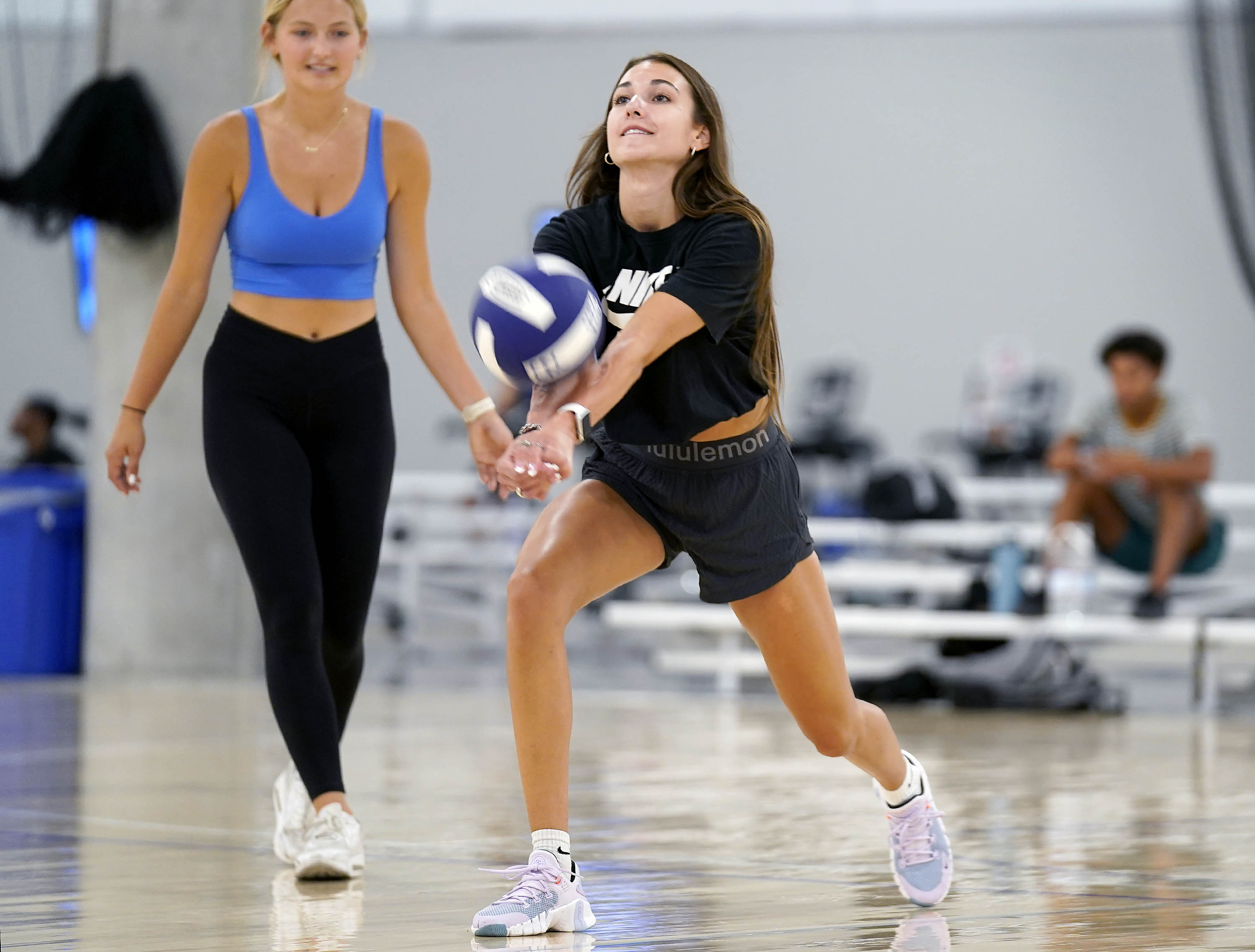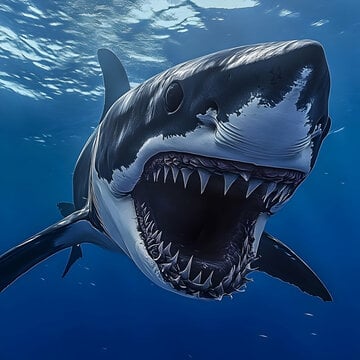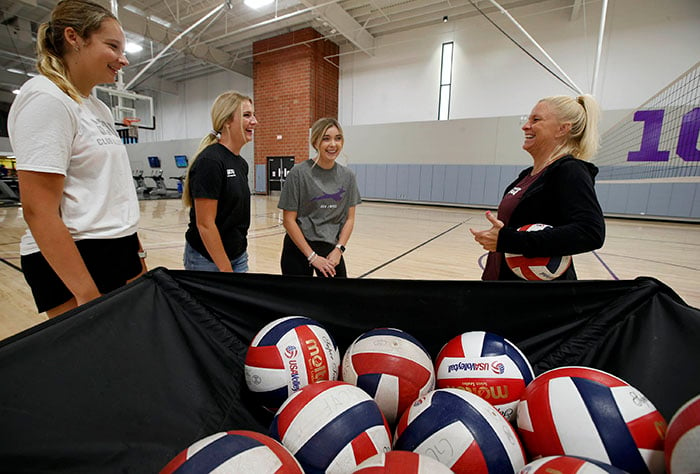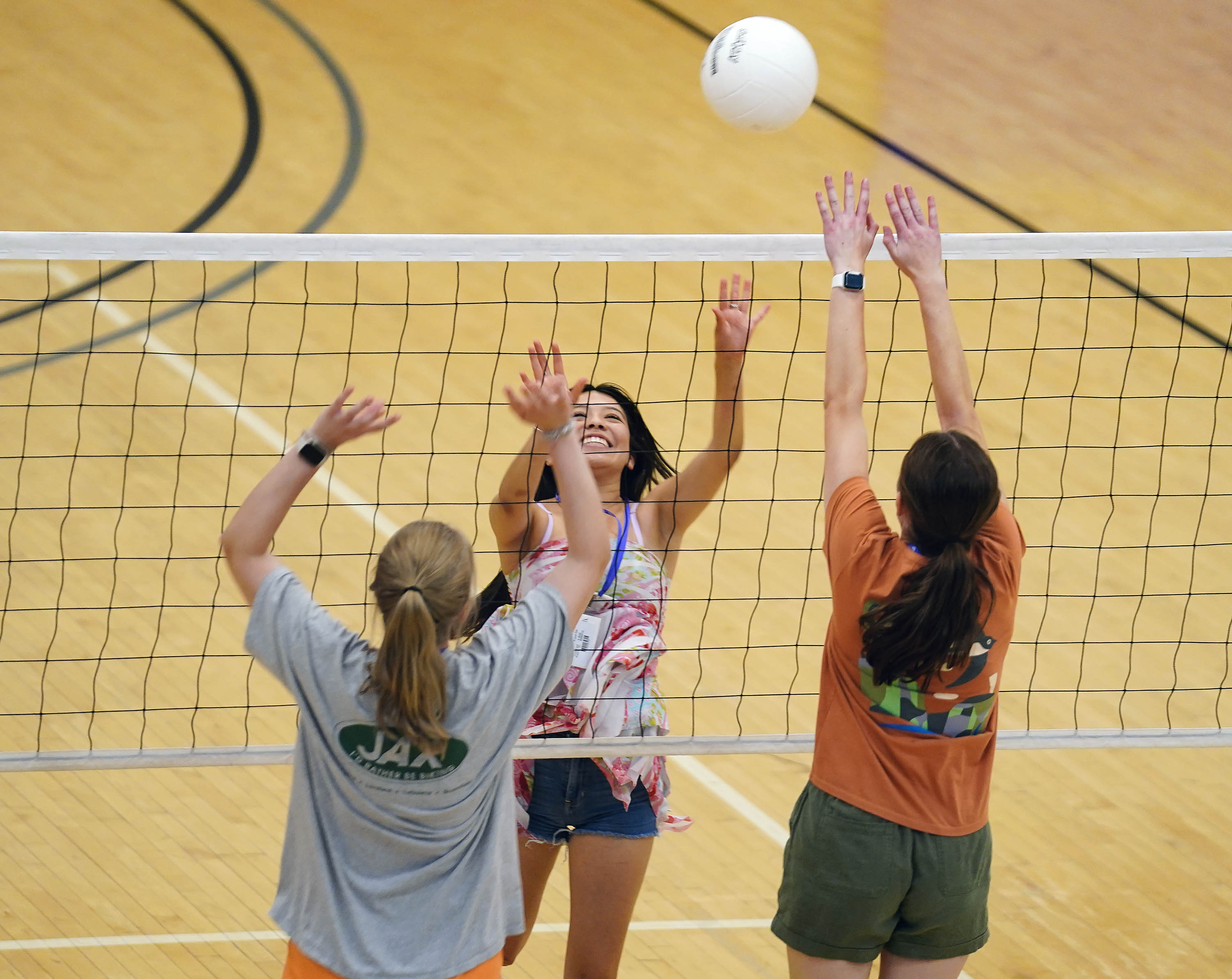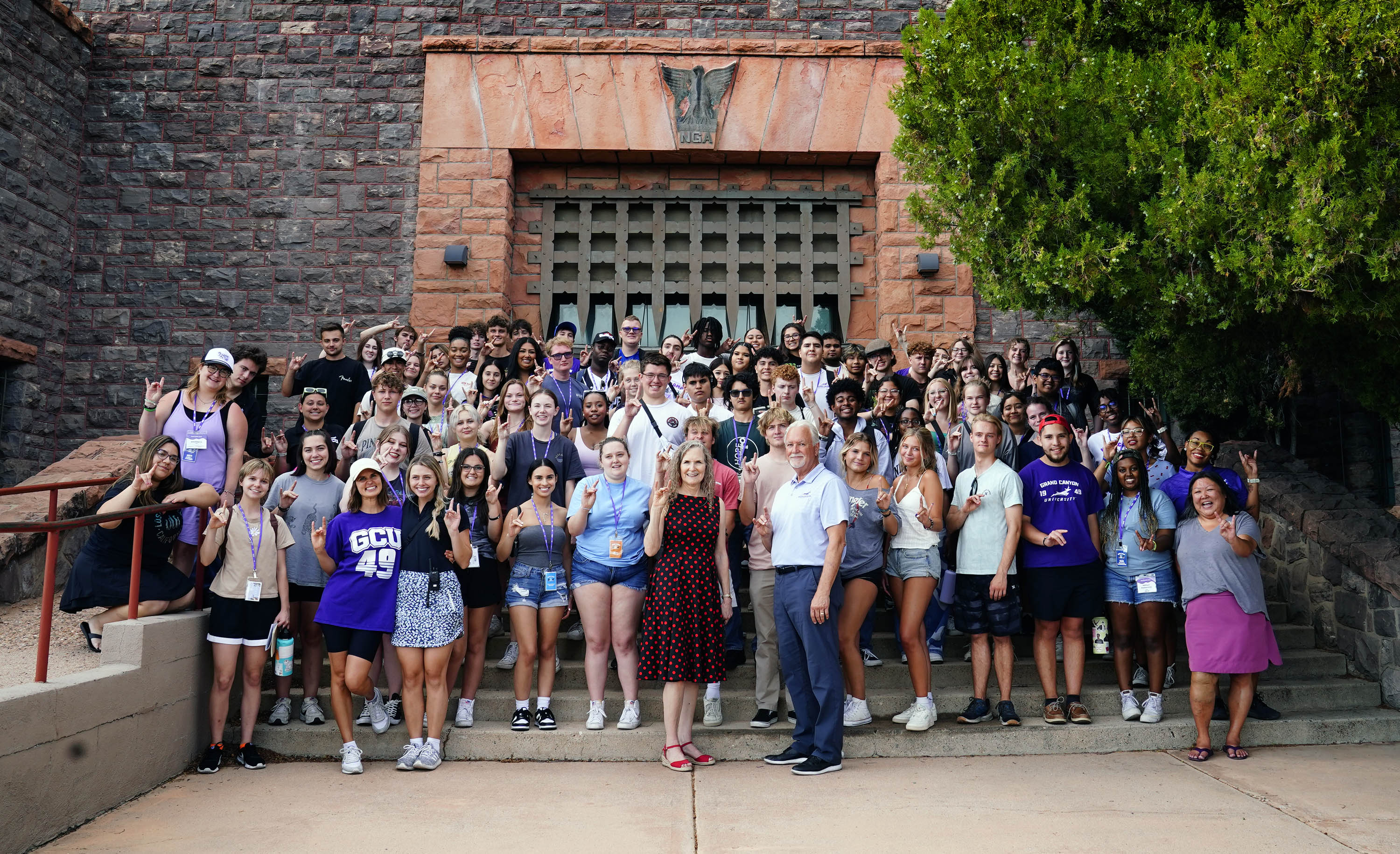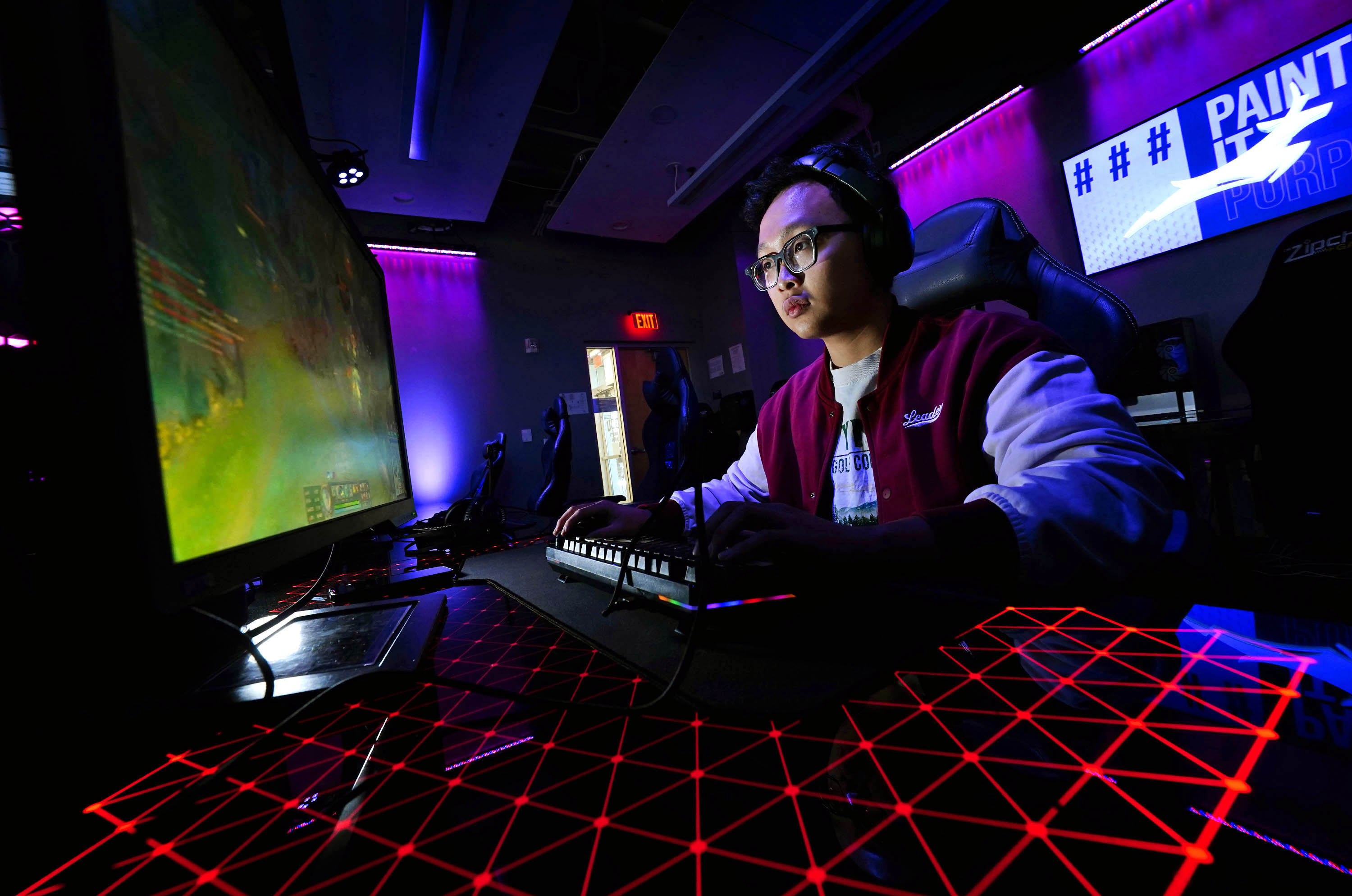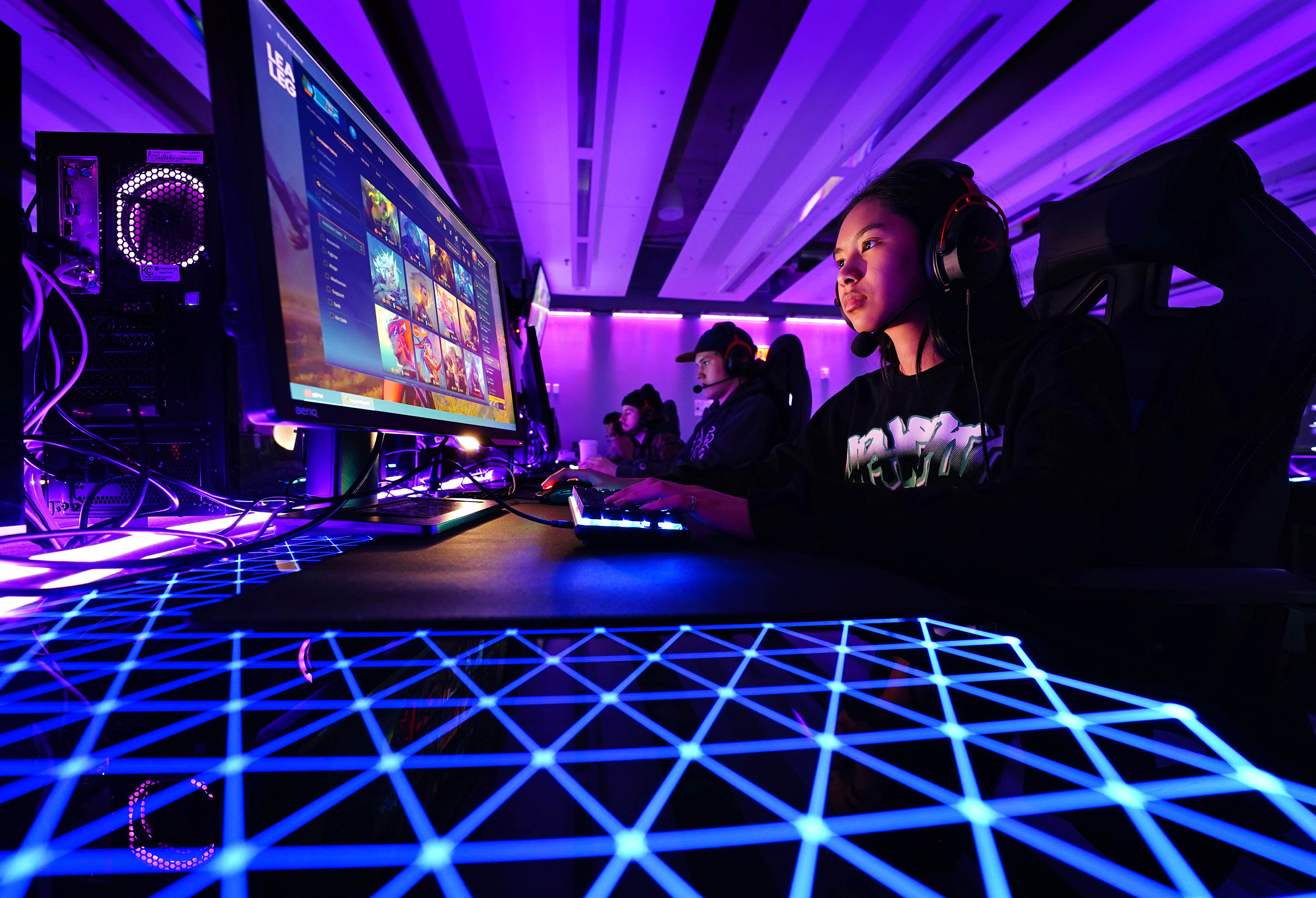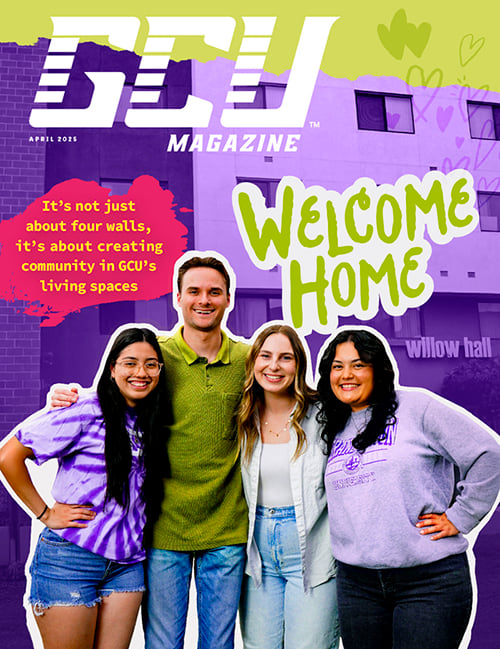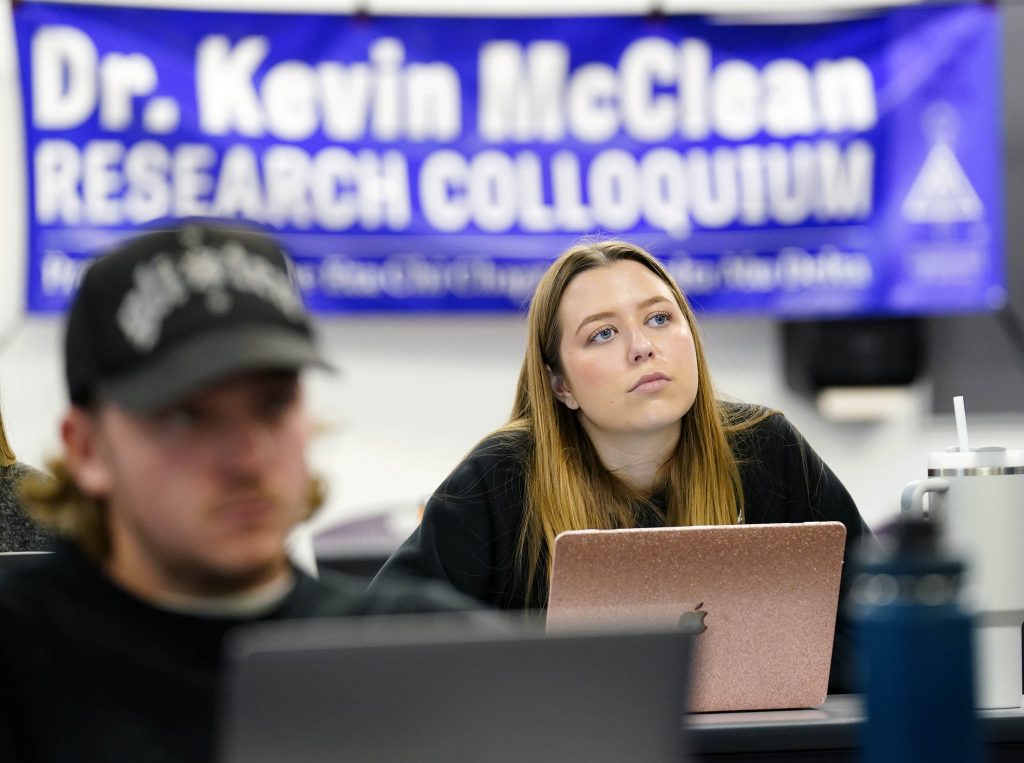
Photos by Ralph Freso
Jiu jitsu might be Keanu Reeves’ preferred form of combat in “The Matrix” films.
But it was Grand Canyon University alumna Heather Noblitt’s preferred subject of study for her master’s degree.
It also was the focus of her talk on Wednesday for the Kevin McClean Research Colloquium, presented by the Eta Chi Chapter of international business honor society Delta Mu Delta.
The annual friendly gathering of academics is a brain-trust congress of sorts, in which GCU’s scholarly community meets up to share their research in quick-as-you-might, 7-minute presentations. (Just call it speed dating between the research aficionado and the academic set.)
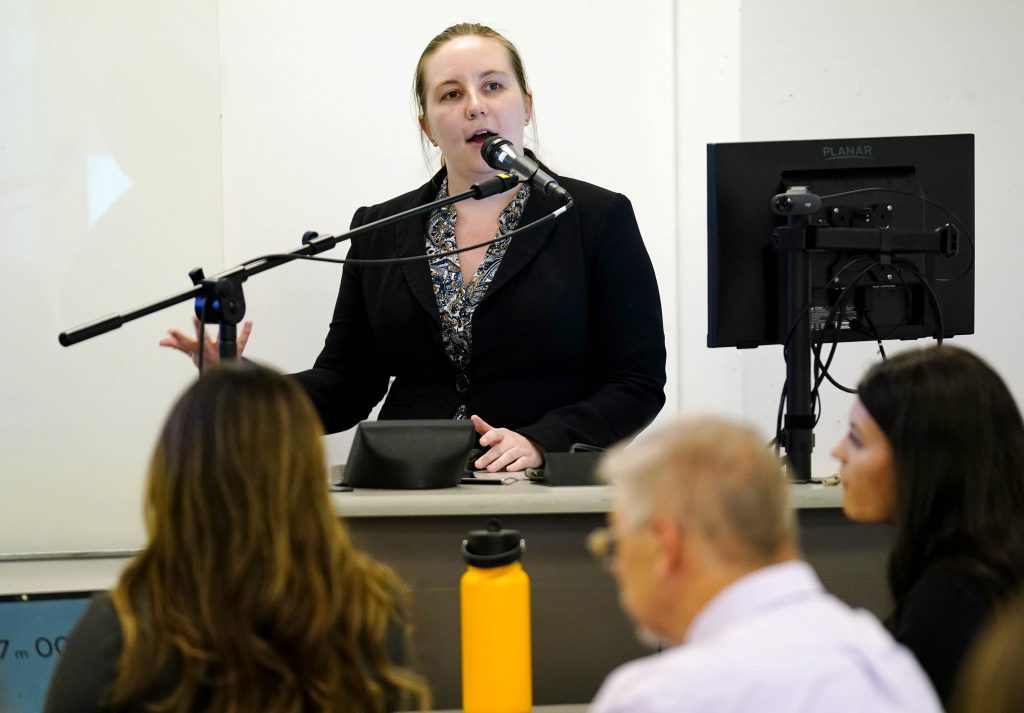
Noblitt was among 34 faculty, staff, students, alumni and outside presenters showcasing their research over two days — 10 of those researchers presenting at an in-person session on Wednesday at the Colangelo College of Business and the rest today in three virtual sessions spanning a generous 4 1/2 hours.
Noblitt, who completed her master’s degree in public health at GCU earlier this year, was looking for a practicum study for her master’s program when her professor connected her with a coach who worked at 12th Street Jiu Jitsu. The gym was looking for someone to look into different aspects of the martial art and how it can benefit people beyond just the physical components.
“I had never even HEARD of Brazilian jiu jitsu before,” said Noblitt, whose colloquium talk was titled “Moving Beyond the Mat: Emotional and Psychological Aspects of Brazilian Jiu Jitsu.” “… When I started participating and meeting a lot of the people that were doing the classes, I noticed that they were very confident. They were exhibiting respect and community. There were all these different aspects in the martial arts.”
What she saw: Jiu Jitsu minimized anxiety and improved confidence and life skills beyond the gym setting.
Noblitt’s presentation wasn’t the only one focusing on health.
Dr. Zachary Ziegler, who teaches exercise physiology, and Anthony Acevedo, a faculty lecturer in exercise science, presented the results of their study, “Impact of Mask Wearing on Post-Exercise Hemodynamics.”
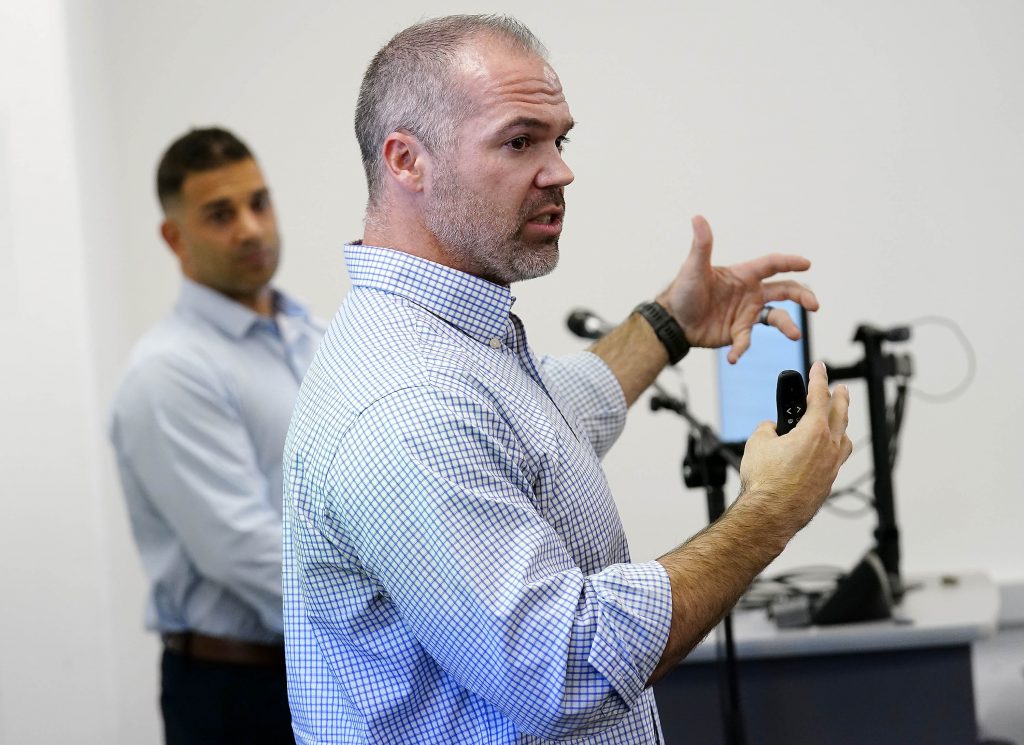
They wanted to find out if wearing masks, which many fitness centers required during the pandemic, might negatively affect a phenomenon called post-exercise hypotension. It is that magical window after acute exercise when resting blood pressure decreases — a good thing, since high blood pressure increases the risk of heart attacks, strokes and other health conditions.
They analyzed 10 healthy subjects over six weeks, some of which did nothing, while others delved into high intensity interval training, going all-out in their exercise for 4 minutes, followed by 3 minutes of recovery. They repeated the cycle four times. Some subjects wore a surgical mask, some a cloth mask and some an N95 mask.
For an hour afterward, Ziegler and Acevedo took the test subjects’ post-exercise measurements.
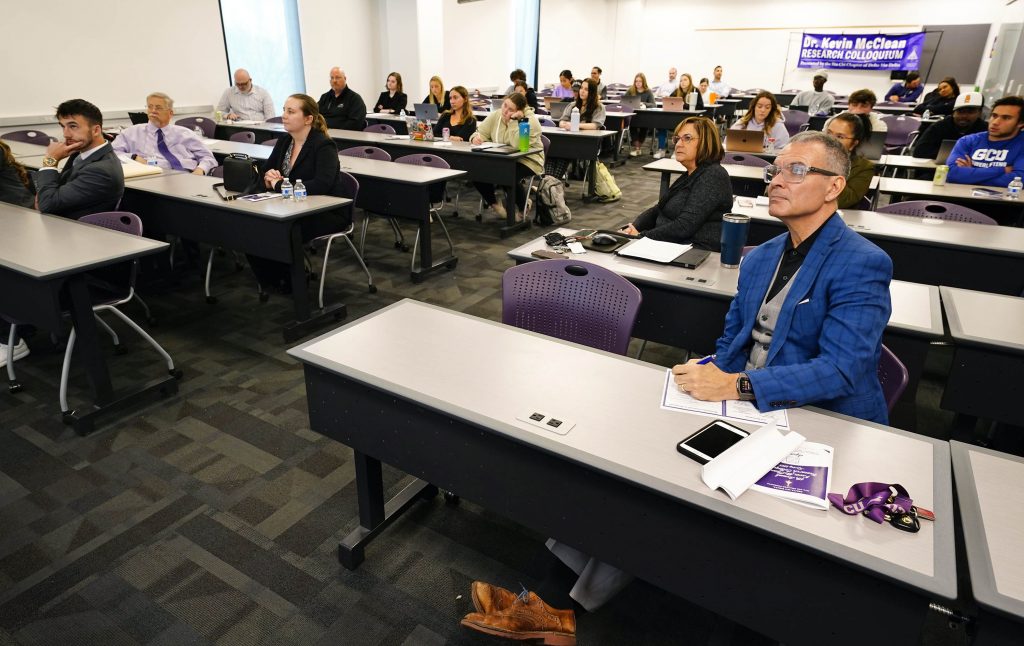
“We looked at what happened during exercise and, essentially nothing,” said Ziegler, who is also a methodologist for the College of Doctoral Studies. Exercising at high intensity with the masks showed no statistically significant differences in hemodynamics, which is how blood flows through the blood vessels, so there was no significant change in blood pressure.
Of all the presentations, the Ziegler/Acevedo research was the one Delta Mu Delta events coordinator Dawson Aaron was biting at the bit to see, since he has an avid interest in exercise as the president of GCU’s Powerlifting Club.
Aaron said the colloquium is one of the chapter’s premier events.
“It means a lot that we can host, just to let other people showcase some of the research they’ve done,” he said.
Delta Mu Delta vice president Kyle Reimer added, “Any chance we have to get our name out there is really important. But also, just in general, the research and to be able to present that and get feedback for all the presentations is really important because it drives innovation. It drives new ideas.”
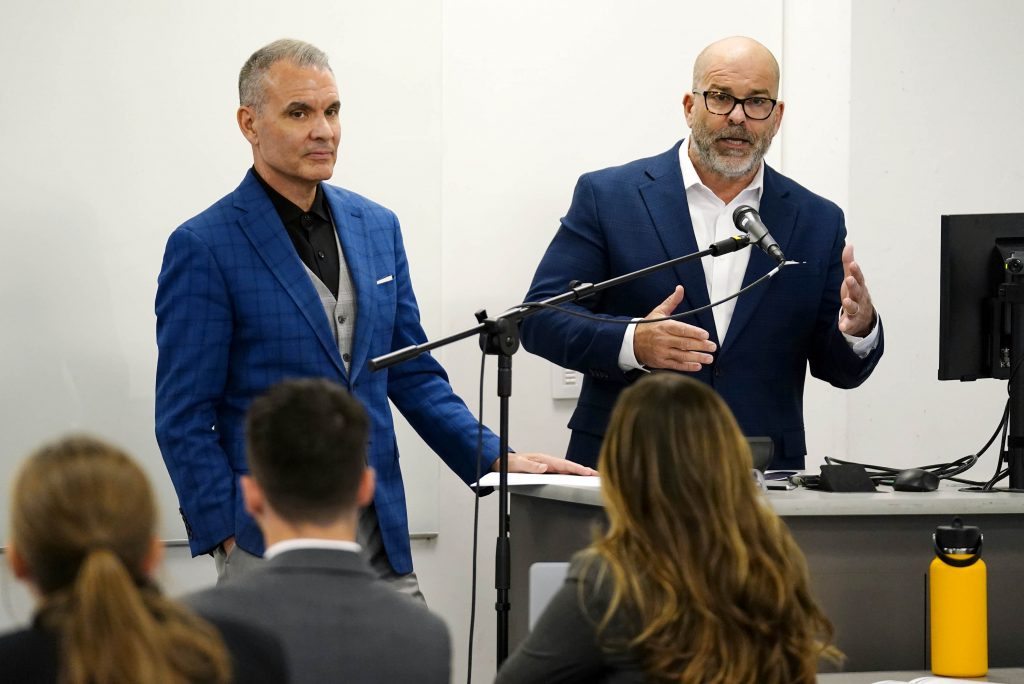
Innovation was something emphasized by the business-minded team of Robert Vera, executive director of Canyon Ventures; Dr. Ronald Berman, Chair of the Doctor of Business Administration program (who presented remotely); and Dr. Nicholas J. Markette, Assistant Dean for the College of Doctoral Studies.
They asked: What happened to Blackberry, the first smart phone, which boasted 80 million users worldwide and had a nearly 100% share of the market?
The company disappeared because of its inability to continually innovate, Vera said.
“The lack of innovation can be fatal,” he added, so he and his colleagues came up with a universal model for continuous innovation called the STAR model for innovation. It stands for Structures (create a plan for innovation), Think, Advocate (find supporters who will move your idea forward) and Run (consider when you go to market, because timing is everything).
It shows how the scholarly culture has grown at GCU. It started from very humble beginnings, and now it's grown into an institution whereby it's almost overwhelming.
Dr. Moronke Oke, Delta Mu Delta advisor
They asked 200 managers of small, medium and large companies: Is innovation ad hoc? Is there a formal structure for innovation? And is there a reward system for those who want to innovate?
One of the surprising things they learned: “More often than not, a picture began to emerge that corporate innovation was being done in silo,” Berman said.
They also found out companies didn’t know the difference between simple product enhancement — changing the color of a coffee cup from blue to brown — and bold initiatives that achieve market domination.
When asked if a current company exemplifies their model of a repeatable, innovative process for innovation, Vera answered: Amazon.
“They’re constantly coming up with new innovations,” Vera said. “ … They fall in love with the problem and they build around it.”
Berman added, “They ask, HOW can we dominate? They don’t ask how can we make Amazon a little better,” because it results in answers that make products a little better rather than truly innovating those big ideas.
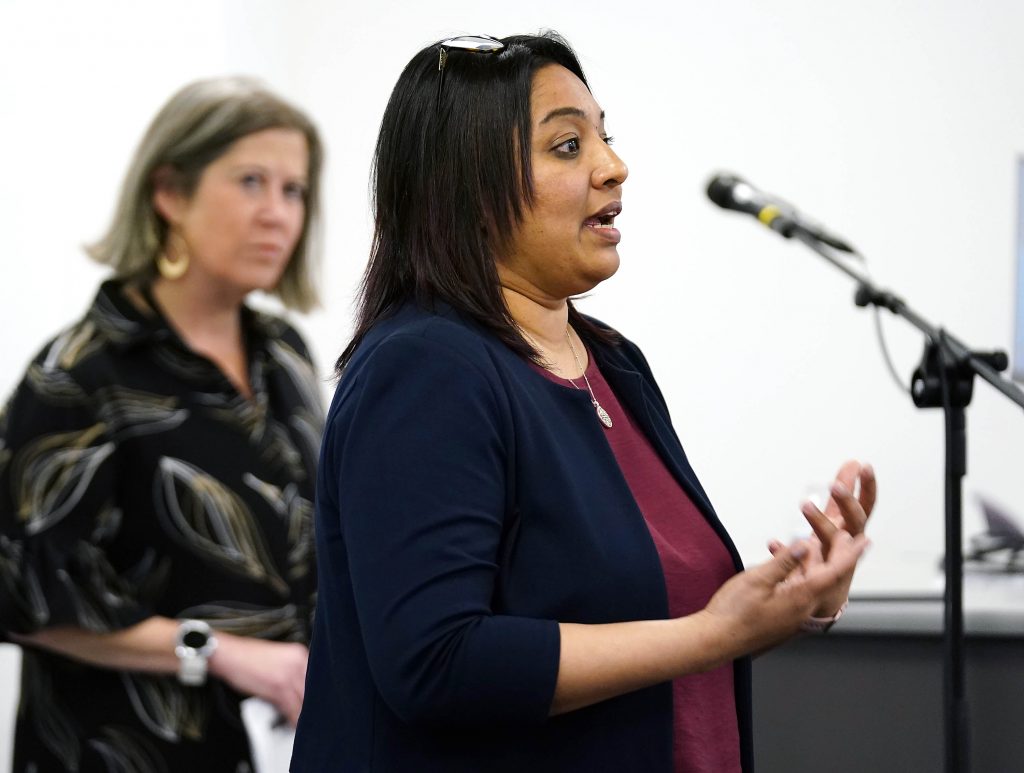
Dr. Moronke Oke, Associate Professor in the Colangelo College of Business and Delta Mu Delta advisor, said the Eta Chi chapter has done more than make the colloquium a little better in the six years it has organized the event.
It was once organized by two people, Oke and McClean, the event's founder who retired from full-time teaching in 2017. Now the colloquium requires a “little army” to do the heavy lifting, some 15 students and faculty members, including Dr. Helen Hammond, Assistant Professor for the Center for Innovation in Research and Teaching. She worked from fall to spring to organize the colloquium, reached out to each presenter and, as a former online teacher, brought her love of online teaching to the event by helping connect Delta Mu Delta to the online population.
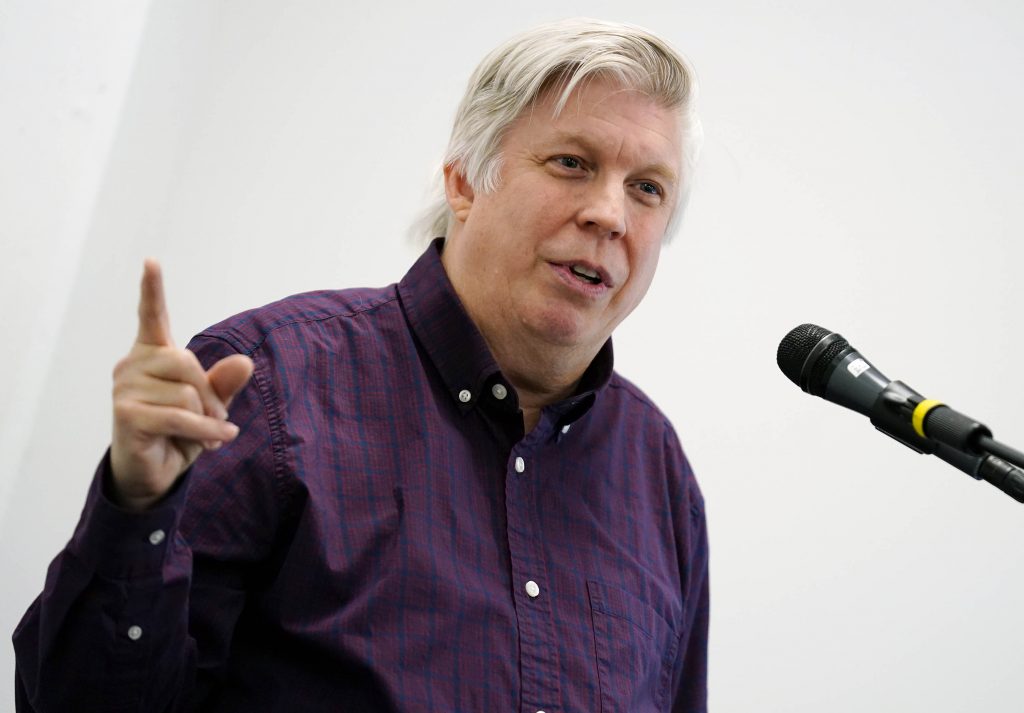
“It shows how the scholarly culture at GCU has grown. It started from very humble beginnings, and now it’s grown to an institution whereby it’s almost overwhelming," Oke said.
At one time, Oke and McClean had to seek submissions to fill spots, and now it spans 25 presentations over six hours, including the four-plus hours of virtual presentations today that will range from the integration of faith and science, to the survival rates of small minority businesses (and the funding they receive), to how K-8th grade teachers keep students engaged in learning.
Heather Noblitt, too, wanted to be engaged in the scholarly community at GCU. She’s an online student, so being on campus helped her feel that connection, just as jiu jitsu in her study helped its participants find that sense of community.
“I really wanted to present … and practice my presentation skills. It also was a great opportunity to learn about other presentations. I was really honored to be chosen for this.”
GCU manager of internal communications Lana Sweeten-Shults can be reached at lana.sweeten-shults@gcu.edu or at 602-639-7901.
***
To access today's presentations:
Related content:

